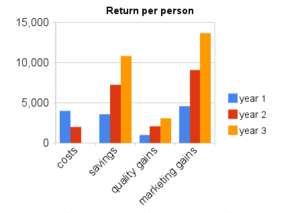| Image via CrunchBase |
I opened a Google AdWords account, compiled a list of keywords, and developed a small group of text ads. Within five minutes of my campaign going live, the four lines of text that I had crafted into an advertisement were appearing on the right side of Google's search results. More importantly, targeted visitors began trickling into my client's website; the power of this marketing platform really struck a chord with me. I had achieved visibility on Google's highly coveted first page using the same keywords being optimized through my "natural search" project.
Let me distinguish between paid listings and natural search listings - I am not suggesting that they are equal in value, but rather competitive in value. Natural listings enjoy a higher perceived relevancy in the eyes of search users; however pay per click advertising, when managed properly, affords businesses immediate penetration into desirable search engine result pages (SERPS). Additionally, paid search marketing is much more flexible in its approach to targeting markets and budgeting for return on investment.
Search engine optimization is a valuable strategy that can deliver a strong return on investment when properly managed. Businesses can cultivate a web presence that organically ranks high in the search engine results pages, delivering requests for quote and product sales. By the same token, the effective implementation of SEO is a long term strategy, often requiring months of development and significant project costs before a return on investment is realized.
Pay Per Click marketing on the other hand is completely measurable, making it possible to monitor profitability on a real time basis. Furthermore, the pay per click model enables marketers to revise their advertisements, budgets, and target audience(s) on a real time basis. This flexibility, when properly harnessed, is the key to an industrial manufacturer's success in the world of Internet marketing.
















